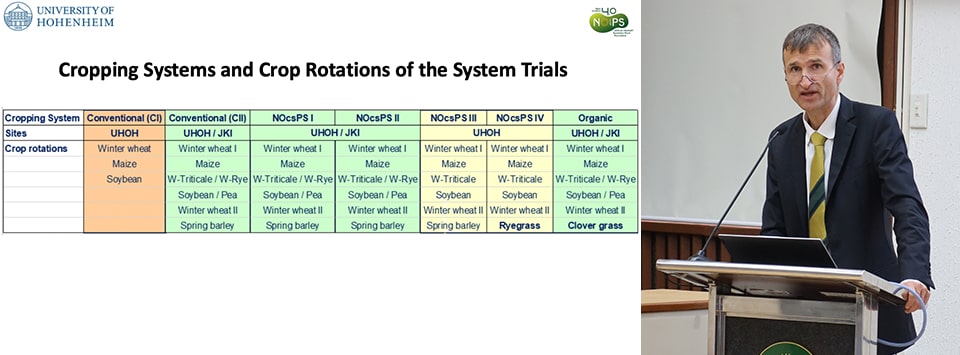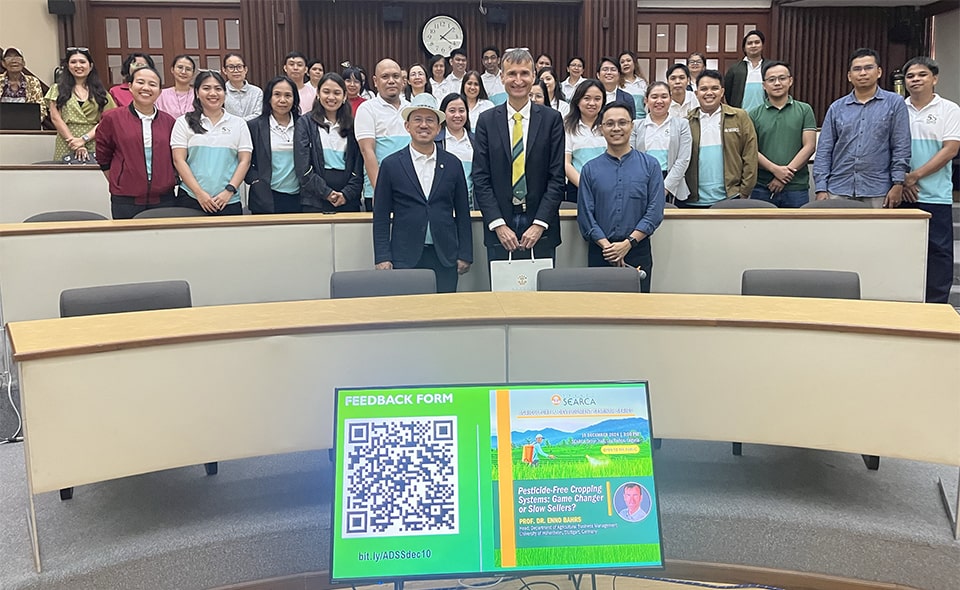The Southeast Asian Regional Center for Graduate Study and Research in Agriculture (SEARCA) hosted Dr. Enno Bahrs under its Agriculture and Development Seminar Series (ADSS) on 10 December at the Drilon Hall, SEARCA Headquarters. He presented the results of their research project on Agriculture 4.0 without Chemical Synthetic Plant Protection (NOcsPS), which explored alternative cropping systems that eliminate the use of chemical synthetic plant protection products (commonly referred to as pesticide-free) while optimizing the use of mineral fertilizers. Dr. Bahrs is the Head of the Department of Agricultural Business Management at the University of Hohenheim in Germany.
Dr. Bahrs explained that social acceptance of chemical pesticides in conventional agriculture is declining due to concerns about potential residues in food products and negative impacts on biodiversity. Meanwhile, he noted that relying solely on organic agriculture to meet future global food demands remains uncertain. He emphasized that NOcsPS cropping systems could serve as a bridge between conventional and organic cropping systems. Conventional farmers could reduce their use of chemical synthetic plant protection products, while organic farmers may consider alternative fertilization strategies, such as optimized mineral fertilizer use.
 Dr. Bahrs explains the different cropping systems and the crop rotations of the system trials
Dr. Bahrs explains the different cropping systems and the crop rotations of the system trials
Meanwhile, Dr. Bahrs presented the four-year yield average of different cropping systems and crops (i.e., maize, soybean, winter wheat 1, winter wheat 2, triticale, and spring barley). To make these systems comparable in their sustainability impact, Dr. Bahrs recommended using the grain unit (GU) as a common denominator in comparing the yields of different fruits and systems. "The grain unit is an indicator that reflects the energy supply capacity of a product with the calculated energy supply capacity of barley, depending on the structure of the use of the agricultural product in feeding," he said. Results showed that in NOcsPS cropping systems, yields are reduced compared with conventional systems depending on the location and the position of the crop in the crop rotation. Yield losses in NOcsPS cropping systems were so far lower than expected.
Dr. Bahrs shared that pesticide-free farming has challenges such as yield loss due to diseases, pest infestation, weeds, economic risk, and marketing challenges due to inconsistent crop quality and limited market opportunities. Meanwhile, pesticide-free farming has advantages, particularly in terms of sustainability and environmental impact. Dr. Bahrs explained that pesticide-free farming has lower toxicity than conventional farming and requires less land per product unit than organic farming. Additionally, pesticide-free farming is a compelling story. He shared that the system is much easier to explain than using less pesticide terms, which can be considered within the scope of an eco-certified system that may involve a lot of rules and standards.
In conclusion, Dr. Bahrs stressed that a prerequisite for a successful and sustainable application of NOcsPS cultivation systems is effective nonchemical plant protection and fertilization measures using modern technologies and suitable site-adapted crops and crop rotations.
Dr. Bahrs also shared that the project's second phase will begin in 2025 to evaluate the long-term effects of these cropping systems on ecosystem services, economic viability, and sustainability.
NOcsPS is a multidisciplinary research project involving the University of Hohenheim (UHOH), the Georg-August-University Göttingen (UGOE), and the Julius Kühn-Institute (JKI). It is one of the eight consortia under the Agricultural Systems of the Future (Agrarsysteme der Zukunft), as part of the National Research Strategy BioEconomy 2030, funded by the German Federal Ministry of Education and Research (BMBF).
Check this out for more details of his ADSS presentation: https://www.searca.org/events/seminar/2024/pesticide-free-cropping-systems-game-changer-slow-seller
 Participants of this ADSS came from SEARCA, UPLB, and other institutions from the Los Baños Science Community.
Participants of this ADSS came from SEARCA, UPLB, and other institutions from the Los Baños Science Community.